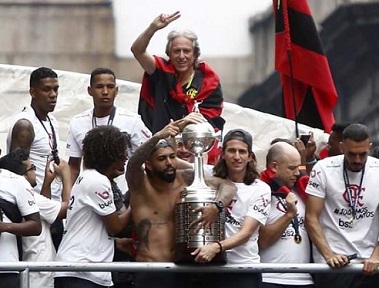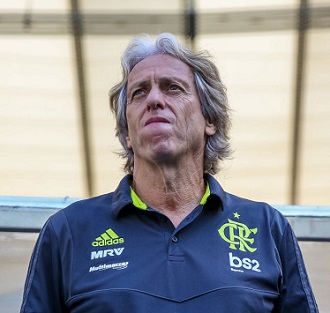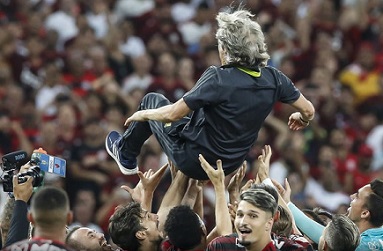 European return awaits?
European return awaits?
“In just five months, Jorge Jesus has reached the peak of his 30-year career,” wrote Brazil’s biggest newspaper Folha after Flamengo, playing under the guidance of the veteran Portuguese, were crowned Copa Libertadores de America champions with a dramatic win over Argentina’s River Plate.
Jesus, who has often been keen to enlighten the local press about his achievements in his homeland with Benfica, concurred with the sentiment. The sports pages would be his again the following day as an historic double was confirmed, with defeat for rivals Palmeiras handing Flamengo their first league title in a decade. Yet the headlines have not always been so kind to a man who arrived in Rio de Janeiro almost certainly unaware of the extent to which he would impact Brazilian football.
The path to the Maracanã Stadium essentially began in Madrid. Jesus, who had been searching for a new challenge since walking out on Saudi Arabians Al-Hilal in January, met with Flamengo president Rodolfo Landim in the Spanish capital in late May. A one-year deal was quickly agreed, with Jesus insisting “the greatness of Flamengo” convinced him to accept the offer.
Jesus started work with his new club several weeks later, but before a ball had been kicked he found himself the subject of criticism for his perceived role in previous incumbent Abel Braga being pushed towards the door. Braga had become aware his superiors were searching for his replacement and tendered his resignation the day before Jesus was announced. Given the revolving door culture that drives Brazil’s coaching landscape, the harsh targeting of Jesus for his part the club’s decision was perhaps a warning of things to come.
When Jesus left Portugal for the first time in 2018, he did so having spent six years with Benfica and three seasons with Lisbon rivals Sporting. Such job security is certainly not routine in Brazil, where previous coach Braga had lasted just six matches of the new season. Jesus needed a strong start and a sensational 6-1 win over Goias in front of a packed home crowd was the perfect way to announce his arrival.
Early battles
The optimism was short-lived. Less than two weeks later Flamengo had been knocked out of the Brazilian Cup, held to a draw by Corinthians in the league and suffered a catastrophic 2-0 defeat to 10-man Emelec in Ecuador in the first leg of the Copa Libertadores knockout stage. The South American equivalent of the Champions League had become an obsession for Flamengo over recent decades; losing to Emelec was not acceptable.
 The knives were out for Jesus. He incurred the wrath of media pundits during the post-match analysis, one of whom mocked his decision-making during the game by comparing him unfavourably with a Brazilian cartoon character, while angry fans arrived at the team hotel after the match to make their feelings known over what was widely regarded as a disastrous showing.
The knives were out for Jesus. He incurred the wrath of media pundits during the post-match analysis, one of whom mocked his decision-making during the game by comparing him unfavourably with a Brazilian cartoon character, while angry fans arrived at the team hotel after the match to make their feelings known over what was widely regarded as a disastrous showing.
Flamengo recovered to progress in the tie and form improved, but Jesus would still find himself under attack from sections of the Brazilian football community. One prominent Fox Sports Brasil commentator went viral in Portugal after a rant bordering on xenophobic and ageist derided Jesus as too old, incapable of understanding his new surroundings and unqualified due to the Portuguese league’s lack of relevence. He has since apologised.
Jesus is battle-hardened. A divisive figure in Portugal, particularly after an acrimonious switch from Benfica to Sporting in 2015, the 65-year-old is used to the sharp end of tongues. However, the unprovoked nature of much of the ire directed his way in Brazil led to an unusually restrained version of the Amadora native. When eccentric Grêmio boss Renato Gaucho bizarrely announced “I have never heard of him; he’s never coached a big club and he’s never achieved anything abroad,” Jesus opted not to fan the flames.
Football does the talking
Instead, he focused on continuing a remarkable run of form which displaced champions Palmeiras from leadership of the Campeonato Brasileiro – costing former Portugal boss Luiz Felipe Scolari his job in the process – and dazzling observers with a brand of football scarcely seen in Brazil in recent generations.
Flamengo are Brazil’s most popular club, despite a long-term struggle for success owing largely to decades of woefully poor administration. A restructuring at the top has led to financial strength and Flamengo have made the three most expensive signings in the country over recent years. With a fanbase far outweighing any other in the country, Jesus arrived to find a club primed to finally achieve major success.
A 21-match unbeaten run far exceeded even those expectations, but perhaps just as remarkable has been the impact of Flamengo’s football. Any lingering snipes directed towards their manager became submerged in plaudits for the way Jesus’ men play the game. In a country historically married to expressive, flamboyant football but more recently reduced to a pragmatic, fearful obsession with results, the contribution of Jesus – and Santos boss Jorge Sampaoli – in demonstrating a proactive attacking game has captured the imagination even of those who are used to cheering against the country’s most glamourous club.
“They play against [champions] Palmeiras like they play against [bottom-placed] Avai,” remarked one Brazilian journalist. Jesus has implemented a high defensive line with intense pressure and gives his players a freedom to attack in numbers; the star striker Gabigol is backed up by attacking partner Bruno Henrique and creative duo Giorgian de Arrascaeta and Everton Ribeiro in a team capable of dominating the play but also proving deadly on the counter attack.
Tá com pouca moral o “Mister” Jorge Jesus? #trmaraca pic.twitter.com/uoAFXKZSHx
— Ivan Raupp (@IvanRaupp) September 14, 2019
‘Mister’ as Jesus is affectionately known, certainly has the utmost respect of both his supporters and his players. Perhaps aware of the Flamengo fan base’s tendency to question the motives of their players throughout their years of underachievement, Jesus immediately upon arrival set about instigating a different perception. “This is the most professional group I have worked with, they want to learn and have a bond,” he said. “In Europe there is an idea that the Brazilian does not like to work hard. I have not found any of this. I have found a team that likes to work and doesn’t turn a blind eye.”
Jesus is never shy to assign himself plenty of the credit – indeed the Portuguese informed the local media that he wished he had enjoyed the benefit of a coach as good as himself during his playing days – but for the most part it has been his Flamengo players cheering the loudest for ‘Mister’ in the sports press over recent months.
“I’ve worked with a lot of coaches, but what he sees in a game is not normal. He should be studied so everyone can learn. What we’re doing is a lot to do with, or totally to do with, him. He’s the best,” Gabigol recently stated. “Jesus helps players to evolve; I’m living proof of this,” said Bruno Henrique in September. “Jesus changed my life in three months. The team is at this level because of him. We have a great coach,” added Spaniard Pablo Mari.
38 years in the making
With club membership, online following and ticket sales all swelling in the midst of the Jesus effect, Flamengo opened up a substantial lead at the top of Brasileirão. A stunning late comeback at Fortaleza in mid-October put Jesus’ men eight points clear of Palmeiras – having been eight points behind at the time of his taking charge – and allowed for better focus on the club’s long-held obsession: The Copa Libertadores de America.
Flamengo had not reached the final of South America’s premier club competition since 1981 when the team led by Zico conquered the continent by beating Chileans Cobreloa across three matches,  and later the world with a 3-0 victory over Liverpool in the Intercontinental Cup. Club president Landim recently admitted Jesus’ focus on the Libertadores during their meeting in Madrid left him enamoured with the Portuguese.
and later the world with a 3-0 victory over Liverpool in the Intercontinental Cup. Club president Landim recently admitted Jesus’ focus on the Libertadores during their meeting in Madrid left him enamoured with the Portuguese.
It was somewhat fitting that Flamengo booked their place in the final with a crushing 5-0 win over Grêmio, coached by newly-acquired nemesis Renato Gaucho, who responded in typically capricious style. “A pregnant woman would’ve scored against Grêmio, Flamengo deserve the 5-0,” Gaucho said, allowing full credit to his opposite number after a humiliating defeat.
And so Flamengo headed to Lima for a meeting with Argentine powerhouses and defending champions River Plate. The almost 5,000 kilometre trip from Rio de Janeiro to Peru’s capital was extended for some travellers by complicated flight plans owing to the late change of venue after Santiago was scrapped as the host city. Reports of supporters spending almost four days making coach journeys depicted a fanbase refusing to contemplate missing out on their big day.
Flamengo arrived as strong favourites, despite River’s vast experience in the competition. For much of the afternoon at the Estadio Monumental – South America’s largest venue – the pre-match assertions appeared deeply misjudged. River, guided by beloved young coach Marcelo Gallardo, played Flamengo perfectly and a 14th-minute goal through Colombian Rafael Santos Borre was followed by a masterclass in organised pressure and positional play which prevented Flamengo from establishing any rhythm.
“At the break, mister was very positive with his instructions. He said we had to continue, we had to get into the game, because they could not maintain that intensity for the 90 minutes,” said experienced right-back Rafinha, who arrived from Bayern Munich shortly after Jesus was announced.
So it proved, with River finally dropping their intensity during the latter stages and allowing more space for Flamengo to devise an inexplicable turnaround. The equaliser, scored by Gabigol in the 89th minute, was exhilarating, but the star striker then latched onto a loose ball just moments later and fired past the helpless Franco Armani, sending the travelling fans in Scarlet and Black into a frenzied and tearful whirlwind as their side made history.
Draped in a Portugal flag, Jesus participated in the post-match celebrations fully aware of what he had achieved. Merely reaching the final had already led to an upcoming ceremony to award him the distinction of becoming an honorary citizen of Rio. Winning the trophy and setting up a potential World Club Cup meeting with Liverpool – 38 years after the teams last met – ensured that a six-month spell in Brazil will forever see Jesus ingrained in club legend.
 What next?
What next?
As the Club World Cup approaches in December, Flamengo still have domestic matches to play in Brasileirão, where their advantage at the top has grown to an absurd 16 points. But for many the topic of conversation turns to how long their Portuguese ‘Mister’ will remain at the helm. Having provoked tactical inspiration many feel could re-invigorate football across the country, there is the prospect that Jesus’ residency in the country could be a brief one.
“Things, of course, will be resolved by the force of circumstances,” he teased after being awarded his Rio citizenship. “My heart says I have to stay at Flamengo. Right now, all the excitement and passion has conquered me. But besides that there are other important factors in the life of a coach.”
Although Jesus maintains the enthusiasm of a man taking his earliest steps in coaching, in reality his situation is perhaps dictated by his advancing years. His stock has scarcely been higher and any offers from major European clubs would surely provide the man who made his playing career as a journeyman midfielder with an opportunity he dare not pass up.
For now, preparation for Doha and the potential meeting with Liverpool. The Club World Cup takes on tremendous prestige in South America and a victory would mean everything to Mengão followers. What is already clear to Jesus is his Brazilian legacy, shaped by half a year in which he inspired, educated and proved many wrong.
“This group will stay in the history of Flamengo,” he says. “No doubt about that. When I’m in heaven, they will talk about Jorge Jesus.”
By Sean Gillen

